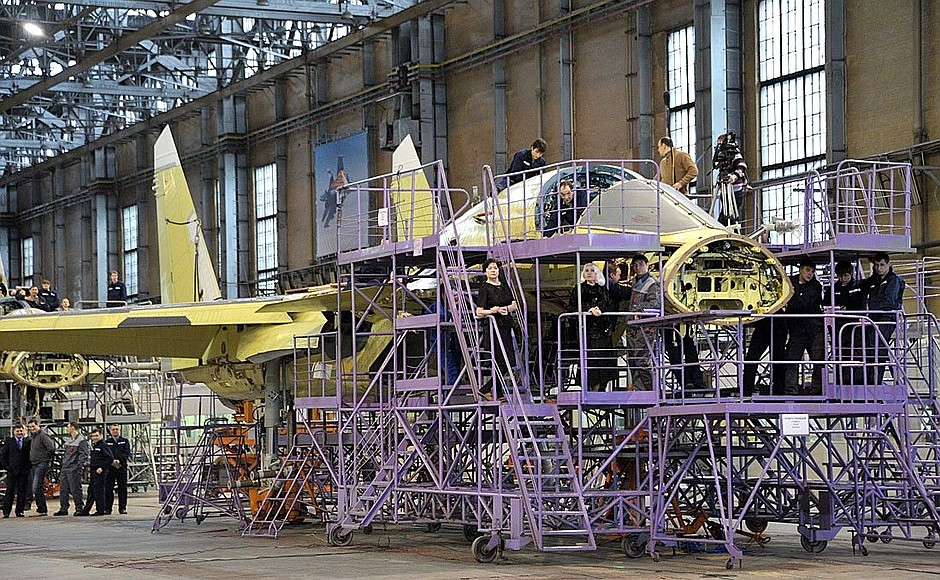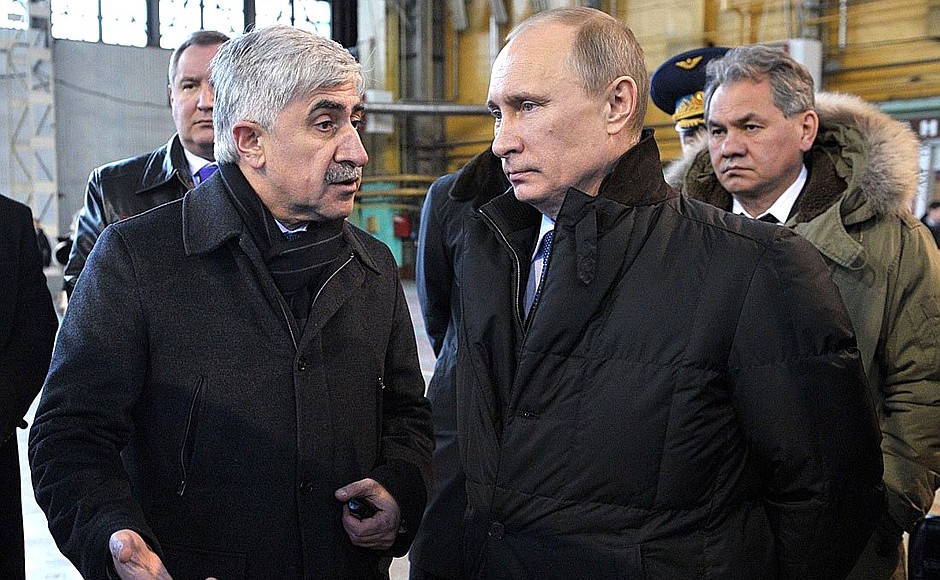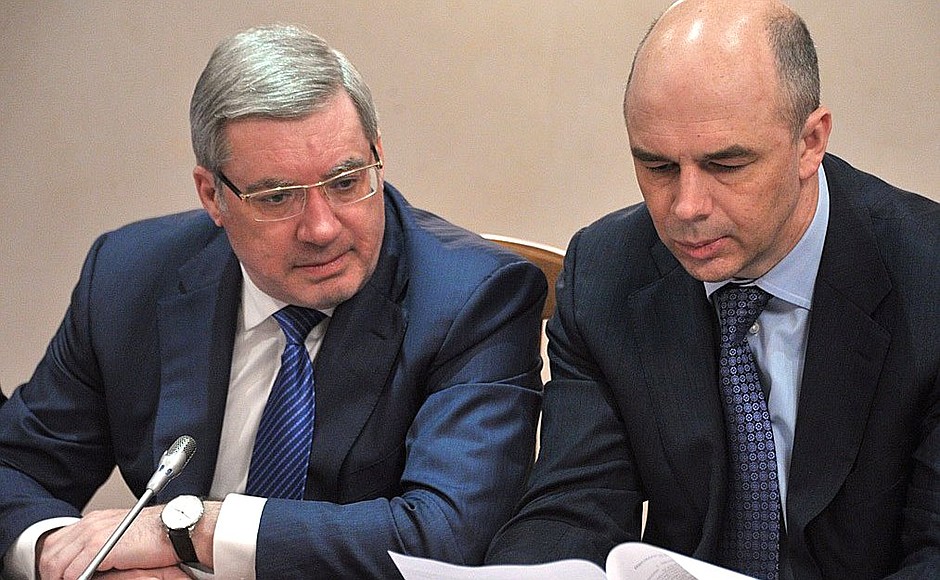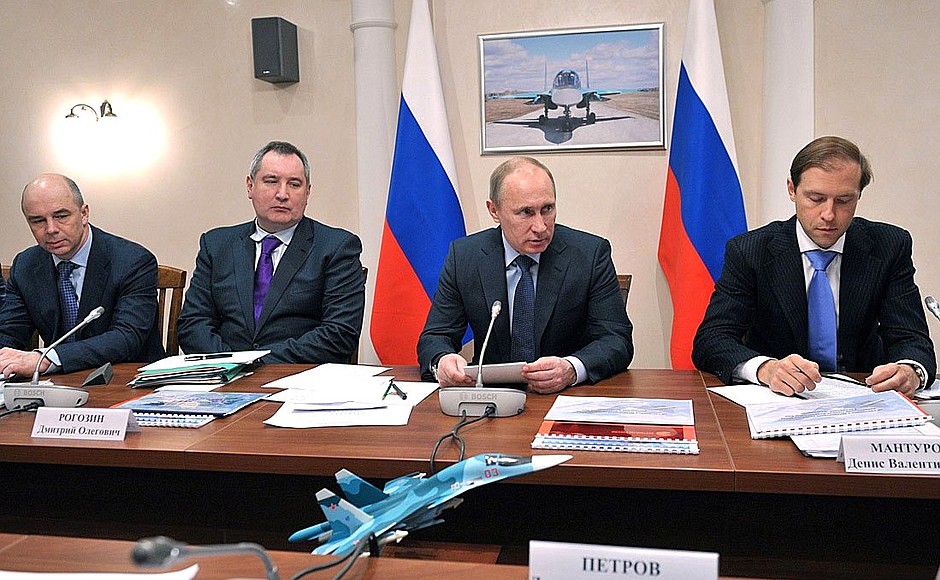See also
* * *
Speech at meeting on the current state and future development of Russia’s military aviation
President of Russia Vladimir Putin: Good afternoon, colleagues,
Last year, we held a series of meetings on modernising the armed forces’ weapons systems, including the discussion last June on implementing state armament programme for aviation technology. We agreed that we would be coming back to these issues regularly and keep them under our constant control. There is no need for me to tell any of you here today just how important this is, but let me say a few words on the subject nevertheless.
At the moment we are fortunate to have the money we need to carry out in full our ambitious defence capability goals, and to do so according to the needed timeframe and quality standards. This is a one-of-its-kind historic opportunity that we must not miss.
We need to put full and proper effort into reaching these goals and realise that this is not just routine work, not a case of ‘what we get today, we’ll get tomorrow too’. No, tomorrow we will not have this money, and we will not have the time either. These are the things we must never forget.
Let me say again how important it is to maintain close contact between those placing the orders and the equipment designers and manufacturers, how important it is to have a clear vision of the technical tasks and understand the demands future weapons will need to meet.
Of course opinions might differ on particular issues, but the armed forces and the defence industry must listen to each other and work in unison, all the more so today, when we are dealing with tasks and problems of a completely different level.
We will practically have to totally re-equip our combat air force. This concerns all different types of aircraft, strike, reconnaissance, transport aircraft – the whole fleet of planes and helicopters.
”We will practically have to totally re-equip our combat air force. This concerns all different types of aircraft, strike, reconnaissance, transport aircraft – the whole fleet of planes and helicopters.“
The new models must be the best of their kind around the world. I want to stress this point. You all realise that if we take today’s models as our future blueprint we will end up lagging behind tomorrow and by evening today will already start having to think about upgrading. We need to look at the future and keep our sights at least a few steps ahead.
We have already begun delivering modern planes and helicopters to the troops. I am talking here about models that have already gone into series production. The Chkalov Aviation Plant here in Novosibirsk is assembling the advanced Su-34 attack bomber. We visited the shop just before and saw the assembly process.
Overall, as I said while talking with assembly shop workers just before, we will put around a quarter of the total state defence procurement budget into re-equipping air force units. As you know, we have a defence procurement budget of 20 trillion rubles [more than $650 billion], and a quarter of 20 trillion is a solid sum – 5 trillion rubles.
We plan to buy nearly 2,000 planes and helicopters in order to bring the share of modern aviation equipment in the armed forces up to 70 percent of the total by 2020. At the moment, modern equipment accounts for only around 20 percent, unfortunately.
The enterprises working in this sector will also need to go through thorough modernisation and bolster their production and personnel capabilities.
Of course it is not an easy task to begin new production and modernise the industry all at the same time. This is a difficult but perfectly realistic goal. Here at the plant in Novosibirsk we have an excellent example of how to go about it. I think the plant’s directors will say a few words about their experience. If it can work here, it can work elsewhere too.
This is precisely the kind of responsible approach I want to see from all industry heads and company directors. The authorities will provide you with all the necessary help and support, and in turn, as we discussed, the Defence Ministry will be constantly monitoring performance of contracts and the whole process of delivering the equipment to the troops.
”Every step we take must make the state defence procurement work more effective and guarantee that we carry out our big plans for re-equipping our armed forces.“
The air force units need to be ready to receive and use the new equipment. You need to use the latest approaches and methods in organising military training. This was something we discussed just recently at the last Defence Ministry Board meeting in Moscow.
A separate issue that I propose discussing today is that of service and maintenance of the new equipment. Skilled and proper service and maintenance is crucial for the equipment’s combat-readiness, service life and operating conditions and for flight safety too. The best solution is obviously to have service and maintenance carried out by specialists from the plants that manufactured the equipment, as they know all of the technical ins and outs of their own products. It would be the proper thing then to include service and maintenance obligations in the current procurement contracts. This is becoming more and more common in many industrial sectors. We are talking about service and maintenance throughout the product’s whole service life. These obligations must apply to the entire service life of the planes and helicopters going into use.
This will make the manufacturers more responsible about the quality of their products and improve service and maintenance standards. It will also earn companies additional money and bring them new resources.
There are various proposals in this area, including making the sector-based holdings solely responsible for carrying out comprehensive contracts for service and maintenance of aircraft. This is a possibility and I have nothing against the idea, but ultimately, it is something the industry heads and the Defence Ministry should decide together. You need to decide whether it is best to have the individual companies take care of this, or have the holdings do it. In any case, I will go along with what the specialists decide. You have a clearer idea of how best to organise this work.
The main thing is that every step we take must make the state defence procurement work more effective and guarantee that we carry out our big plans for re-equipping our armed forces.
<…>



